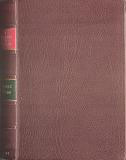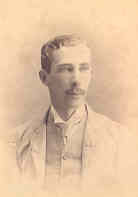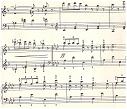It had
been agreed in 1917 that Harold be appointed Chief Political Liaison Officer
in Cairo. On 27th August 1918 he was instructed to remain there at the request
of Sir Reginald Wingate, the High Commissioner, on account of his exceptional
knowledge of Aden and Arabian affairs.
Ellen
and the family had been spending the Summer months in England and the Winter
in Aden, later Cairo. She had bought a car in England and had it shipped
to Aden. Harold, a competent rider of horses and camels, could not number
driving a car as one of his accomplishments, and the vehicle was soon written
off.
.jpg)
What
was to have the greatest impact on his career was the mission to Sana, which
he described extensively in his book Kings of Arabia. I have done much research
into this in the India Office and Foreign Office Papers, and further details
appear in my biography of him. It had been decided to send a mission in
the name of King George V to Imam Yahya, titular King of Yemen, and Harold
was chosen by Lord Allenby to lead it. I cannot possibly describe the affair
here in any detail, but his mission was taken prisoner by tribesmen hostile
to Yahya, and friendly to the Turks.
The British
East India company had occupied Aden in 1839, because it was considered
crucial as a fuelling station for sea traffic between Britain and India.
British influence had spread from there into the interior of South Yemen,
the Aden hinterland as it became known. The Northern part of Yemen was a
Turkish province administered by an official called the Vali. An
armistice had been signed by the Turks on 30th October 1918, but their troops
were still spread throughout much of their former empire, including parts
of Yemen. The titular ruler of that part of Yemen not under British control
was governed by Imam Yahya. He had been fighting the Turks between 1904-1911
and Sana the capital of Yemen had been in Turkish hands. When recaptured
by the Imam it had been in a constant state of siege. It was decided to
send a mission to Sana, the object being to discuss the future of the country
after the Turks' withdrawel.
Harold
made an error of judgement. He took the circuitous route to Sana, via the
Red Sea port of Hodeida (modern Al-Hudaydah) which led to his capture and
detention by hostile tribesmen. He went on to make one fundamental mistake
in that, having been captured, he did not hand over negotiations in full
to Major A S Meek, who had been instructed to carry these out, in order
to secure the mission's release. He compounded this by making an agreement
with the Kuhra tribesmen without authroity from the Foreign Office.
The mission
was eventually released. Harold returned to Aden and from there to London.
Whilst he knew Lord Curzon the Foreign Secretary well enough, he refused
to see Harold. There was a split within the British establishment as to
how policy in thus part of the world should be run, arguably there was a
lack of policy. Many in the establishment sympathised with Harold, but in
the event he did not get the satisfaction he sought. He and Meek were totally
at logerheads as to what had indeed happened, and their accounts differ.
This controversy did Meek's career no good. Harold had built up a good relationship
with Yahya, facilitated by his knowledge of the Koran and of course his
ability to speak Arabic fluently. Yahya was also a pious Muslim, something
that did not go down well with the Foreign Office . There were however many
in the Foreign Office who sympathized with Harold's predicamet.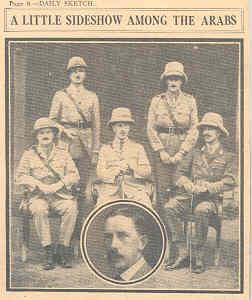
Harold
had been in receipt of a salary of £1500, plus expenses, not bad for
the time, but found it difficult to find subsequent postings to his liking,
notwithstanding the fact that he was held in high esteem by many. He did
get a posting as political agent in Gohil Wad Prant, Kathewar, in India.
In India he visited Ghandi in prison to see what motivated him, or to put
it into modern parlance, what made him tick; we don't know what conclusions
he came to. He retired from the army in December 1921 and came back to live
in England.
It was
then that the most bizarre episode of his life begins. A syndicate had been
formed in June 1923 trading under the name of Zayd Ltd. Its purpose was
to open up trade with the Yemen and to obtain a concession for mineral exploration,
principally oil. Its backers were G M Weekley, a barrister, Herbert Weld-Blundell,
the owner of Lulworth Castle, a wealthy landowner and archaelogist in Iraq,
Lord Lovat (Simon Joseph Fraser, 14th Lord Lovat and 3rd Baron Lovat 1871-1933)
and Messrs Chapman Guthrie & Co. engineers. There were four directors
of the company, the first two named above and a demobbed major A D Spiers
and Harold. My father is quite insistent that Lord Harmsworth was also a
finacial backer, although I find no written evidence to support this. In
any case, it could only have been Harold Sydney Harmsworth, 1st Viscount
Rothermere (1868-1940). The issued share capital was £10000 of which
Harold held 1500 shares. It was said he had been introduced to this syndicate
by Spiers. He and Harold were employed as the company's representatives
in Yemen.
Some
in the foreign office suspected Harold of going back to Sana to complete
unfinished business. I don't believe that. His principal motive was to earn
an income to support his family. He had four dependent children and faced
a much reduced life style. So where better to go to improve his fortune
than Yemen, a land he loved
He had
corresponded with Imam Yahya for a year before and must have known that
he, Yahya, desired a treaty with Britain. Yahya was a wily political. The
Turkish General Said Ali Pasha had once described him to Harold as the pick
of the Saidi bunch, but a fanatic. Was Yahya using Harold? Undoubtedly.
Was Harold using his position within the Arab world and the contact he had
to him? Undoubtedly.
Harold
and Spiers set off for Aden. He adivised Major C J Barrett 1st Assistant
Resident there on 27th October 1923 that he was on his way. The relationship
was cordial as Harold writes in code Al-Arabic dying to discuss his
intention of going to John. For Al-Arabic read Harold, for John read
Yahya. In fact, I have a number of Harold's books in my possession and he
inscribed them Al-Arabic, the Arab.
They
left for Sana by 23rd November 1923 and visited Yahya, taking with them
many gifts including a Bassett Locke large gauge model steam railway. This
was laid out in the palace courtyard and played with enthusiastically by
palace officials. 78 rpm records were also taken, and dance music of the
day found most favour. On 28th November General Scott advised the Secretary
of State that Europeans and Americans had visited Sana from time to time
with a view to commercial enterprise. He had always believed that the Europeans
had been entrusted with semi-political missions, but could not prove it.
He thought a British mission to explore commercial enterprise a good idea.
Spiers
returned to Aden on 9th January 1924, reporting a considerable degree of
success. Harold remained at Sana. Spiers carried a personal letter from
Yahya to King George V, and another to the Colonial Office. The letter to
King George V was not passed onto him. The Colonial Offuce insisted that
such a letter should go through official channels. They feared a commercial
firm would not be slow to take advantage of such recognition - perhaps so.
The letter was translated and printed in full by HMSO. Yahya wanted a treaty
with Britain and recognition of his realm. He claimed he had been promised
the return of the port of Hodeida after the Turks had surrendered there,
but in the event it was given to the Idris, who also had claims to sovereignity
in Yemen. Then there appeared before me a commercial deputation under
the leadership of Colonel Jacob, a man of exceptional integrity and parts
and well versed in the Arabic language. He wanted to work the country's
resources, but Yahya wanted a treaty as a basis for this. Harold was accussed
of drafting the aforementioned letter himself. I find that difficult to
believe. Yahya was a learned religious leader, let along a shrewd politician.
Might he not have found it rather insulting for such a letter to have been
written for him? There was much spin at play on the part of the Government
at the time. Aden informed Yahya that Jacob had no Government backing in
this matter and that the letter to King George V should be forwarded through
official channels. Yahya replied that he could chose any medium he wished
for one monarch to communicate with another. The basis for a trade deal
had been negotiated and agreed upon, but this was contigent upon a treaty
with Britain; this was not forthcoming. The authorites in Britain and Aden
now truned hostile towards Harold.
Yahya,
writing to Harold on 11th Macrh 1924 states he had turned down other concessions
to foreigners in favour of the British. Perhaps, or this was but a negotiating
stance. Yahya had been threatening military action to regain his ancestral
rights, mainly land. Harold wrote to him stating that Zaid Ltd cannot hope
for a concession until the conclusion of a political treaty. Your excellency
is aware that I am your warm friend and admirer, and that I more than any
other - am studying your best interest. He quotes an Arab poet: How oft
have I succeeded by diplomacy when the sword would have neen disastrous.
So Oh best of freinds, keep your armies off our British Protegies, so that
after a time, if Allah so decrees, the Government may be induced to give
you some of such tracts. This is hardly the tone of a man prepared
to place British interests last. Harold wanted to arrive at a conclusion
beneficial to the Government, Yahya and his syndicate. In the event a treaty
was signed by Yahya with Italy. There was much lobbying reported in the
British press.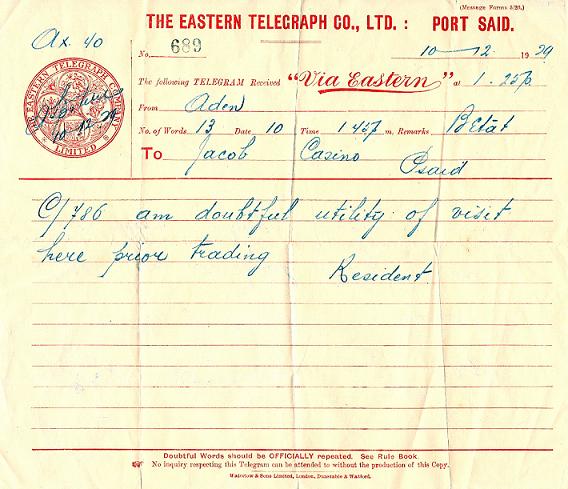
Harold
visited Sana again in 1928 and in 1930. Officialdom had tried to put him
off in 1928, as a telegram in my possession reveals. Yet one could not do
so without causing, in their words, a grave scandal. P H Hoare, the Acting
High Commissioner, writing to the residency in Aden, stated that Harold
had apparently said to an Englishman that he had obtained from the Imam
the concession for exploring oil and that he was acting in this matter for
a millionaire, but would not say whether he was an Englishman or not. This
was rather uncharacteristic of Harold, as he tended to keep his own council.
It occured to Hoare at the time, that he may be acting for a Mr Crane, whose
incoherent interests in Arabia were well known. Incoherent indeed !
Charles Richard Crane was a wealthy American from Chicago, a philanthropist
and Arabist. He was invited to Saudi Arabia by Harry St John Philby and
in May 1933 facilitated a contract for oil exploration between Saudi Arabia
and the Standard Oil Company of California; this for a 60 year period. In
1936 a treaty of freindship was signed between the two countries. This spelled
the decline of British influence in the Middle East.
I believe
that had the Government, riven as it was between the two policies for Arabia,
supported the attempt to bring about a conference , then a treaty of benefit
to all parties may well have been signed. The opportunity was missed. In
fact a treaty between Britain and Yemen was not made until 1934, with a
proposal for obtaining oil concessions following in 1936. BP did not have
an oil refinery there until 1954. Yahya was assassinated in 1948 and was
succeeded by his eldest son, the penultimate Imam Ahmad bin Yahya (1891-1962).
He was to forge many bonds with communist regimes. I feel his experience
with earlier British vacillations may have been largely to blame for this.
Zaid
Ltd eventually ceased trading. Harold's interest in Yemen did not waver.
On 20th October 1932 he read a paper before the Grotius Society titled:
The Kindom of Yemen: Its place in the comity of Nations. I should love to
have known what the delivery was like. The content was certainly erudite
and well presented. Looking at the photographs of him, and speaking to my
father about him, I always thought he was rather a dour man. Imagine my
surprise when reading his paper as to how much wit it contained.
Harold's
circle of acquaintances had been wide. Perhaps the fact that he was a freemason
contributed to this, as also to his rapid rise to success. He knew Harry
St John Philby, yet Philby did something Harold did not - he went native.
Harold remained a Christian throughout his life. He converted to Islam in
1930, in later years buying a second wife in a market in Jeddah. His son
Kim came to stay with Harold's family during a school holiday. My father
remembers going with him to the Natural History Museum and the RAC club
swimming baths. There was no inkling of the treachery he was to display
in later years as a British/Soviet double agent.
Perhaps
the most well known individual in his sphere was T E Lawrence, better known
as Lawrence of Arabia. In 1974 I made a recording of some of my grandmother's
reminiscences. She spoke about her times in Cairo where she had first become
acquainted with Lawrence over tea at Shepherd's Hotel. The recording has
never been published, but I give some sound excerpts from it below. Lawrence
wrote to Harold asking him to subscribe to a limited edition of The Seven
Pillars of Wisdom, which he was preparing for the press. The sum asked was
30 guineas. Unfortunately Harold did not subscribe to it. It would have
been a good investment.
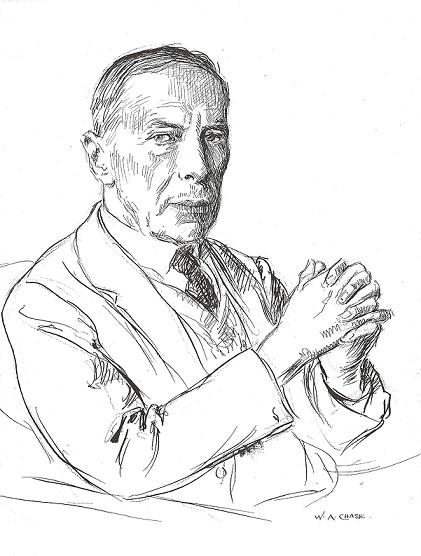
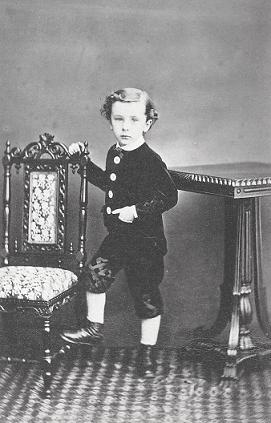
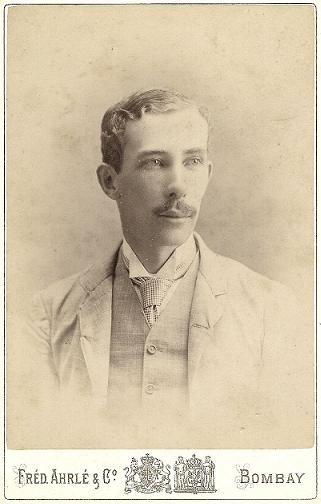 Harold had learnt to speak, read and write Arabic fluently and showed at an
early stage an immense propensity for the study of the peoples and culture
of South West Arabia. He was commissioned a Lieutenant in the Bombay Staff
Corps in 1889. I won't give details of all his advancements and posting -
they were many - but he rose exceptionally rapidly through the ranks of the
Bombay Political Department, serving both in India and South West Arabia.
By 1913 he had been made Lieutenant-Colonel. In the period 1904-1907 he was
Political Agent in Dala, in the Aden Hinterland, 1st Assistant Resident, JP
and Acting Resident Aden 1910-1917, Chief Political Officer Aden Field Force
1914-1917, and 1919 (despatches).
Harold had learnt to speak, read and write Arabic fluently and showed at an
early stage an immense propensity for the study of the peoples and culture
of South West Arabia. He was commissioned a Lieutenant in the Bombay Staff
Corps in 1889. I won't give details of all his advancements and posting -
they were many - but he rose exceptionally rapidly through the ranks of the
Bombay Political Department, serving both in India and South West Arabia.
By 1913 he had been made Lieutenant-Colonel. In the period 1904-1907 he was
Political Agent in Dala, in the Aden Hinterland, 1st Assistant Resident, JP
and Acting Resident Aden 1910-1917, Chief Political Officer Aden Field Force
1914-1917, and 1919 (despatches).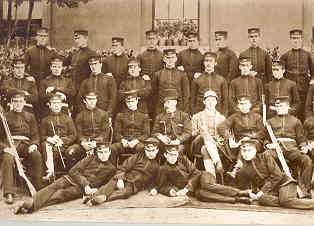
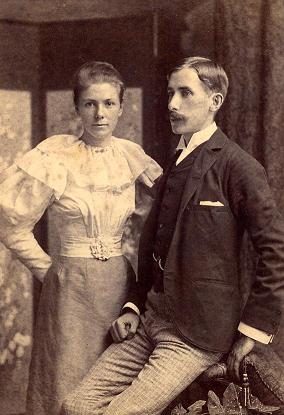 In
his book 'Kings of Arabia' Harold praises the work of the Danish mission in
Aden, and here he met
In
his book 'Kings of Arabia' Harold praises the work of the Danish mission in
Aden, and here he met .jpg)



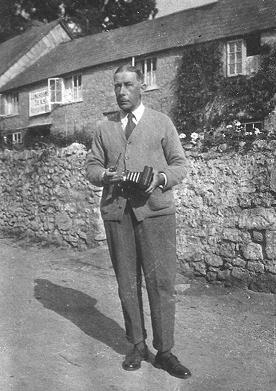
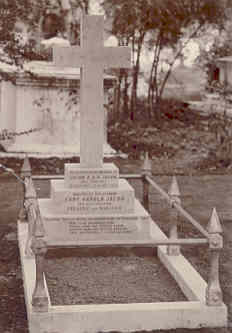
.jpg)
